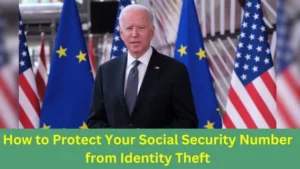How to Protect Your Social Security Number from Identity Theft Your nine-digit Social Security number (SSN) may be the key to getting hired, getting credit, or opening a checking account. Unfortunately, it’s also the key that unlocks all sorts of opportunities for crooks, who are looking to steal your identity or your money.

To avoid an SSN nightmare, keep your social security number safe by storing it in a secure location, don’t share it with other people and make other moves to ensure it doesn’t fall into the wrong hands. Here are eight steps to take toward keeping your Social Security number safe.
1. Secure your Social Security Number
You can lock your Social Security number. If your SSN has been compromised, you probably do not know this, but you can lock it to prevent unauthorized access.To block electronic access to your SSN, call the Social Security Administration at 800-772-1213. Once you have made your request, any automated telephone and electronic access to your Social Security file is blocked.When your file is blocked, neither you nor anyone else will be able to see or change your personal information online or through the automated telephone service from the Social Security Administration.
2. Never Carry Your Social Security Card
One of the easiest ways to protect your Social Security number is to simply not carry your card. Then, you won’t lose or have stolen it when you are not at home. The Social Security Administration recommends you only carry your card with you if you need to show it to an employer or service provider. Other times, the agency advises you to store your Social Security card with other important papers like passports, birth certificates, and insurance policies-again, ideally in a safe.
3. Do Not Give Your SSN To Unsolicited Callers
Unless you are absolutely sure of the identity of a caller, you should never give out your Social Security number over the phone. Social Security representatives typically do not call people. If there is a problem with your Social Security number or your Social Security card, the federal agency usually sends a letter to you in the mail. However, the agency will call you if you:
- Recently applied for Social Security benefits
- Currently receiving payments and need to update your record
- Have specifically requested to be telephoned by the Social Security Administration
4. Shred Any Documents That Contain Your SSN
If you do not need to hold onto them, shred any documents that contain your SSN. These include the following:
- Tax returns
- Pay stubs
- Loan statements
- Medical bills
Ideally, you want to use a micro-cut shredder for this since it will cut the documents up into smaller pieces than others do.
5. Don’t Use Your SSN When Possible
Social Security numbers are the No. 1 way that government agencies and private organizations identify Americans. Still, it’s best to avoid using your SSN as a general form of ID if possible. You may sometimes be able to substitute in your passport or driver’s license number instead of the Social Security number for things like employment applications. Some government agencies, however, such as tax agencies and motor vehicle departments, may need you to provide your number.
6. Don’t E-mail or Text Your SSN
You could e-mail or text your SSN, but don’t. Why? A hacker could intercept the number and use it to commit fraud.
Alternatives to sending an SSN safely include:
- Password-protected and encrypted file-sharing services
- Secure online portals, such as those offered by banks and government agencies
- In person
- By certified mail
Conclusion
Protecting your Social Security number is very important for defending your identity and financial well-being. You can easily safeguard your SSN from thievery or misuse just by taking the simple preventive measures of protecting your SSN, avoiding its frivolous disclosure, and handling all documents relating to your SSN carefully and responsibly. Keeping watch over your personal information puts it at safe hands.
Frequently Asked Questions
Why is it important to protect my SSN?
Your SSN is a key identifier used for employment, credit, and financial transactions, making it a target for identity thieves.
How can I lock my Social Security number?
Contact the Social Security Administration at 800-772-1213 to block electronic and automated access to your SSN.
Should I carry my Social Security card?
No, it’s best to keep your card securely stored at home unless you need it for specific purposes like employment or government services.